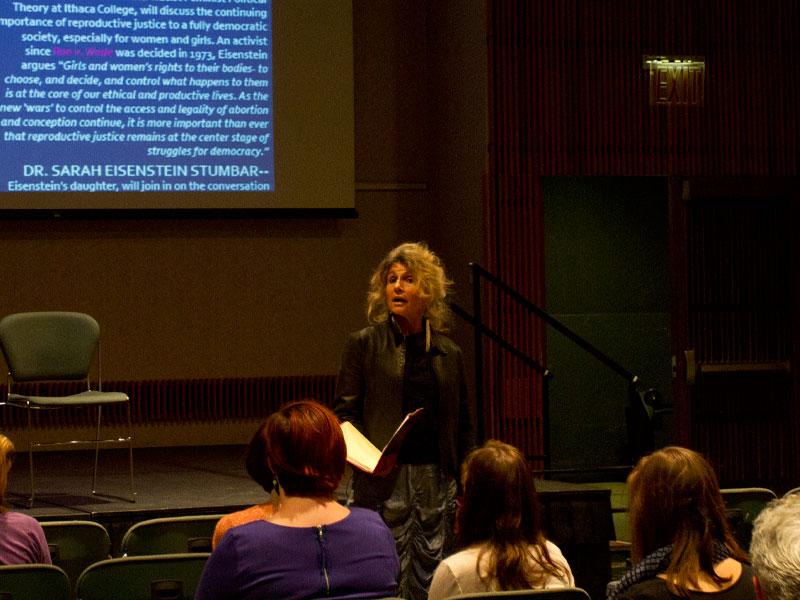With the music of Neko Case playing, the college community was ushered into Emerson Suites for Zillah Eisenstein’s lecture Tuesday. Both are activists on women’s issues, and Eisenstein, a professor emerita of politics at the college, used this year’s 40th anniversary of Roe v. Wade as a starting point for a deeper discussion on reproductive rights.
The event was held in observance of Constitution Day 2013. This nationwide celebration stems from a May 2005 congressional mandate that all educational institutions receiving federal funding are required to hold a program pertaining to the U.S. Constitution on or around Sept. 17 of each year, the day the document was signed in 1787. Though it is a private institution, the college falls under this jurisdiction because some students receive federal financial aid.
Eisenstein’s speech, “Reproductive Justice: Celebrating and Defending ‘Roe’ at 40,” was co-sponsored by the Office of the Provost and Vice President for Educational Affairs, the Department of Politics, the Women’s Studies program and the Park Center for Independent Media.
Beth Harris, associate professor of politics and chief coordinator of the event, said there are a number of constitutional provisions that have been used to support women’s rights, such as the right to privacy outlined in the Fourth Amendment and the Equal Protection Clause of the 14th Amendment.
“The Constitution has been foundational in terms of establishing the right of women to choose to end their pregnancy or to continue it,” Harris said.
Though it is integral to her lecture title, Eisenstein said it can be problematic to celebrate the 40th anniversary of Roe v. Wade because by only focusing on the court case, some may disconnect it from the historical and political struggle that brought about the decision.
“Roe v. Wade is very narrowed down,” she said. “The real language of the moment was that women wanted sexual freedom.”
Roe v. Wade, Eisenstein said, is embodied entirely in the one particular moment when women said they had a legal right to choose, yet it remains insufficient for allowing them to explore and to define what it means to be a sexually free human being.
“To me, democracy is not about voting, and it’s not about two-party systems,” she said. “It’s about being able to have your body free. It is the most inclusive site for understanding political struggle.”
Eisenstein’s daughter, Dr. Sarah Eisenstein Stumbar, joined the discussion via video and later Skype to provide a medical perspective on the topic. As a resident physician in the Department of Family and Social Medicine at Montefiore Medical Center in the Bronx, Stumbar is at the forefront of women’s health care.
She said she went into medicine because she believes in social and political equality, and that access to health care — intrauterine devices and abortions included — is a human right.
“The clinic that I work at works very hard to provide access to other forms of birth control for our patients and then to provide access to abortion care with the idea that not every woman who gets pregnant wants to stay pregnant,” Stumbar said. “That is an integral part of providing full-spectrum reproductive health care.”
Senior Lucia Brown is co-president of the campus organization Feminists United. She said she was disturbed to see that generation after generation of women — Eisenstein’s, Stumbar’s and now her own — are still fighting to hold onto the rights granted to them by the Roe v. Wade decision in 1973.
“That these are still conversations we’re having is insane,” she said. “We should be beyond this.”







